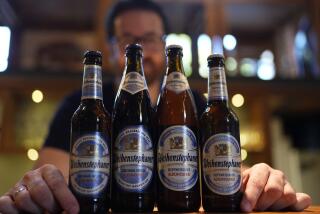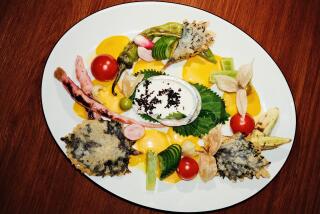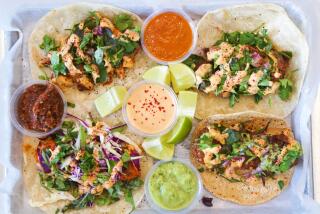France has (finally) discovered craft beer. There’s even one called ‘La Guillotine’
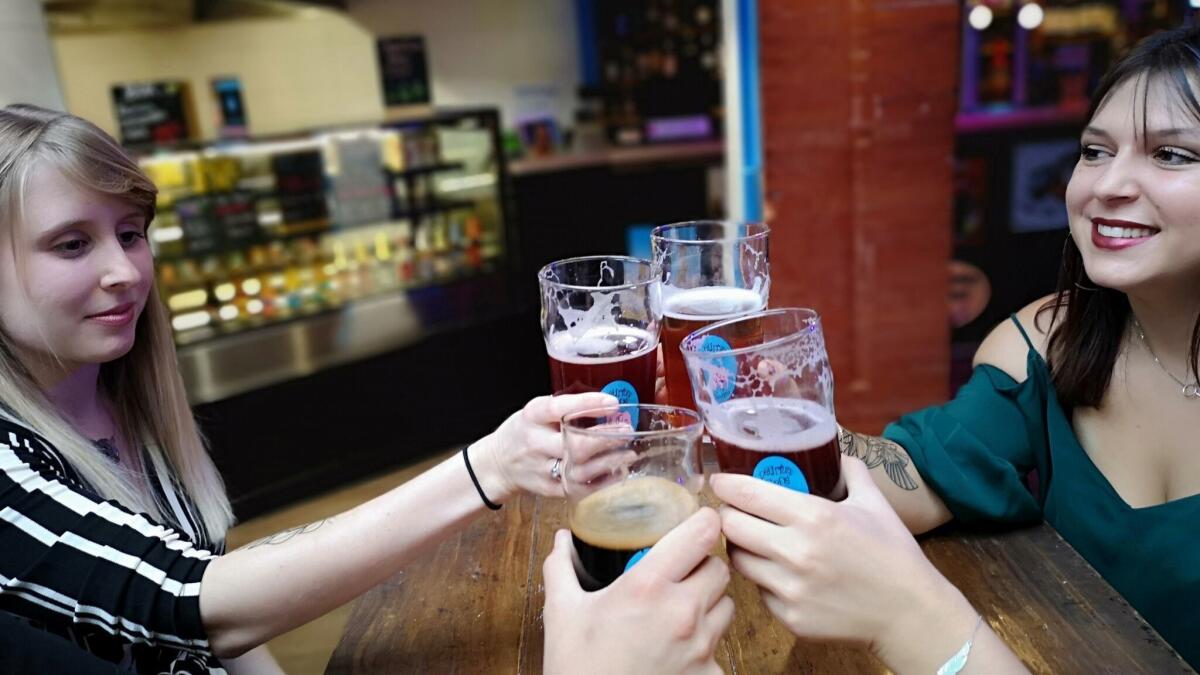
Reporting from TOULOUSE, France — Nicolas Nougarede realized a lifelong dream when he opened his wine shop, Cave Enoteca 31, in this southwest French city. It was a leap into the profound historical, economic and cultural appreciation of wine that is so closely associated with France.
Five years later, Nougarede seems as surprised as anyone when he gazes at a wall of his shop that is lined with shelves of beer. After initially deciding it might be wise to offer a few token brews, he now sells 120 varieties.
“It’s a real beer BOOM,” he said, giving the word extra emphasis. “Beer has found its place at the table in France again.”
It’s hard to overstate how dramatically the market for beer has changed in this wine-soaked country. After declining for 36 consecutive years, the amount of beer consumed in France has grown about 3% annually each of the last four years, according to the Brewers Assn. of France.
Across the country, American-style brewpubs are sprouting up. Department stores are selling DIY homebrew kits. Restaurants and chefs are incorporating more beers into their menus. And on the cafes dotting sidewalks and plazas, it’s no longer uncommon to see a tabletop full of golden-hewed pint glasses offering refreshing competition to a chilled summer rose.

Perhaps the capstone of this cultural revival came this summer when two of France’s dictionaries announced they would add the synonyms bierologie and zythologie (definition: the study or expertise in beer).
“The demand and interest is growing,” said Elisabeth Pierre, a zythologue who travels the country organizing beer tastings, workshops on how to appreciate beer and trainings for those who would like to be bierologues. “There is a phenomenon in how attitudes toward beer have improved.”
No one will mistake France, the world’s second-largest consumer of wine, for its beer-guzzling neighbors in Belgium, Britain or Germany, which respectively each year drink 18 gallons, 17.7 gallons and 27 gallons per capita, according to the Brewers Assn. of Europe. The French downed a mere 8.5 gallons per person in 2017. Still, that’s up a half gallon from four years ago, and it means that beer is steadily closing the gap with wine consumption, which has fallen from 26.5 gallons per person in 1975 to 12 gallons in 2016.
That enthusiasm was on full display at Pigalle, a beer bar that opened in the heart of Paris this year around the corner from the famed Moulin Rouge. On a warm evening, a young crowd was packed around the stainless-steel counters, staring at an illuminated sign that listed the 20 beers currently on tap. A server patiently explained the different varieties, with such names as Jungle Joy, Red My Lips and Night Drift, offering tastes to customers who carefully weighed their options (bitter? fruity?) before selecting a brew to accompany the decidedly un-French food options of hot dogs, tacos and Belgian fries.
The taproom was opened in March by the Belgium-based Brussels Beer Project, a cooperative effort to encourage innovative brewing techniques. The founders looked across the border, saw the explosive interest in beer and decided to open their third location in Paris.
Beyond just serving beer, Pigalle organizes tastings and workshops to educate customers about the brewing process and how to better appreciate various varieties of beers. It is an essential part of French culture to not just search for good food and drink, but to thoroughly understand it. What gives it that aroma? Why that color? What does the amount of foam indicate?
“For a country that has so much taste for good foods and good wine, it was surprising that France was behind in its quality of beers,” said Maxime Pecsteen, the “export shaman” of Pigalle. “Now we see that more and people are excited about beer.”
Mahe Bradfer is one. While working at a cafe in Paris, she developed a taste for beer and eventually discovered she had a palate and passion for it. Her self-taught proficiency led to a job this year as the official beer selector for Delirium Cafe, a massive taproom that opened this year in Toulouse.
Delirium is the kind of beer-themed bar that would have been almost unthinkable in France a few years ago. With two floors and 47 taps that are topped with the bar’s signature pink elephant mascot and include names like La Guillotine and La Bete, Delirium is the latest franchise of its famed Belgium namesake and claims to be the biggest such watering hole in France.
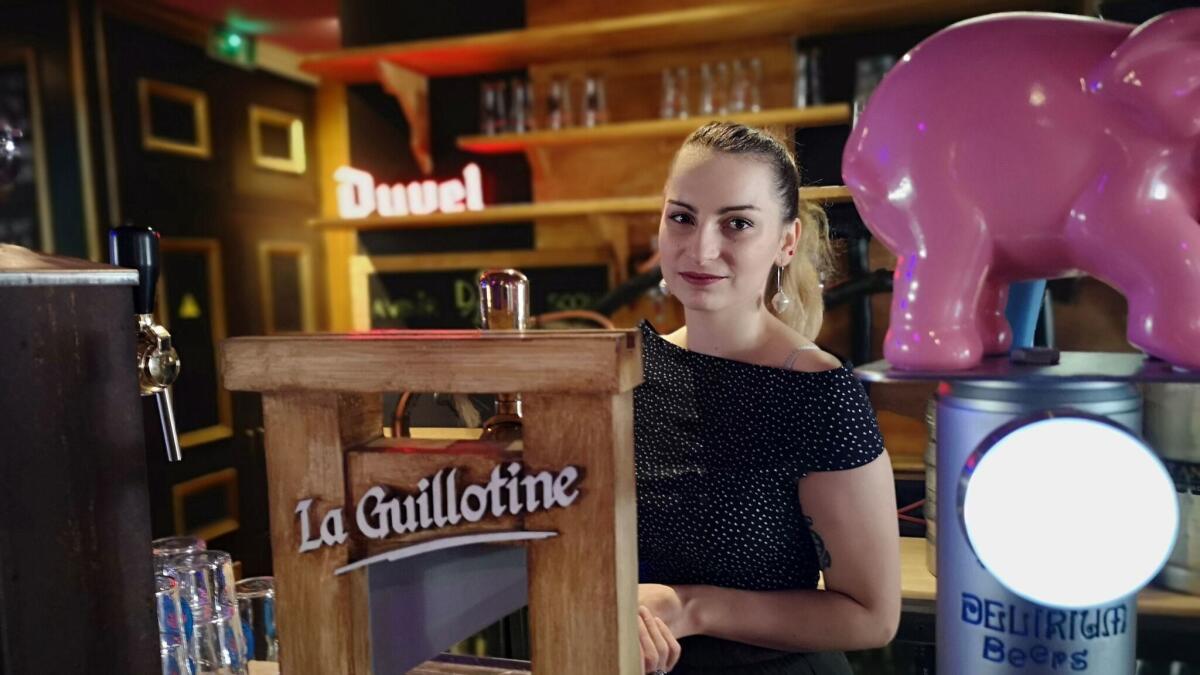
Bradfer spends her day sampling beers from local and international brewers, trying to ensure a wide variety and to know as much as possible about the beers and their brewers.
“Every beer has a story,” she said. “And the clients want to hear that.”
Beer was once considered nearly as important as wine in France, even more so in the northern regions of Brittany, Normandy and Lille, with their cultural ties to Britain and Belgium. In 1910, there were 2,987 breweries in France. But World War I wreaked havoc on this industry, leaving only 919. World War II took a further toll, and the industry went into steady decline until only 23 breweries remained in 1976, according to the Brewers Assn.
Even worse, the beer sold here committed the worst of all possible offenses in French gastronomy: It was “uniform” and “industrialized,” two of the dirtiest words in France.
What finally got the taps flowing was the belated arrival of the craft beer movement, decades after it was launched in the United States, Britain and other places. The number of producers has doubled since 2015. France is now eighth in volume of beer produced annually, according to the Brewers Assn.
The resurgence is being led by people such as Simon Mabille. On a recent morning, Mabille was working the two-man bottling line at Brasseur Toulousain.
Mabille fell into beer-making as a hobby while living in Montreal, where he also met his wife. He returned to Toulouse and recruited his brother Martin as a third co-founder to launch the brewpub last year. Their biggest challenge is now keeping up with demand for their beers, which are found in shops and restaurants across Toulouse.
On this day, they were bottling Blue Bay, a pale ale described as an “Eden of calm and pleasure” that offers “sips of summer sun” far from “bitterness and grayness.” This is his best-selling beer, a kind of gateway brew while Mabille coaches customers to appreciate some of the more complex beers in the adjacent tasting room.
“We want our customers to get used to bitterness,” he said. “Someone says, ‘Well, I don’t like beer.’ And I say, ‘That’s because you don’t know beer.’”
The Mabille family story points to another less obvious, but critical aspect of the microbrew revolution: the entrepreneurial freedom it offers. France’s economy and culture are extremely rigid when it comes to choosing work, with young people making initial choices about careers early in high school, and then navigating a strict system of education, training and diplomas that make it daunting to change jobs later in life.
By contrast, beer production became so insignificant for so long that it seemed to have escaped the notice of bureaucrats who didn’t bother to put in place the usual labyrinth of rules. Anyone can grab a homebrew kit, teach themselves and launch their own microbrew.
The only requirements are just good taste and a little start-up spirit.
“Beer is much freer, and as a result, you have people with different backgrounds who are trying to make their mark,” said Maxime Costilhes, director of the Brewers Assn. “This is really different from what we see in other professions. Beer is much simpler. We have adopted the mode American. There is lot of liberty in beer.”
This momentum already has people like Justin Marquez and Nicolas Kreutzer looking toward the future. The pair opened Toulouse brewpub Barallel with wine aficionado Clelia Michel-Moryc. Marquez is also one of the founders of local beer association Les Amis de Poulpie, which is in the last stages of organizing its third annual citywide Octobiere festival.
Among the tastings and workshops and networking, there is expected to be much discussion around the question of how to move from making really good beers to developing a taste that is distinctively French.
“We don’t yet have a very French way to brew,” Kreutzer lamented. Marquez concurred, adding, “The main goal is to create a really great beer. But craft beer in France is really just in its adolescence.”
O’Brien is a special correspondent.
More to Read
Sign up for Essential California
The most important California stories and recommendations in your inbox every morning.
You may occasionally receive promotional content from the Los Angeles Times.
